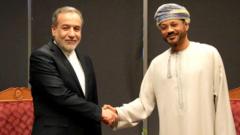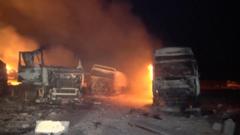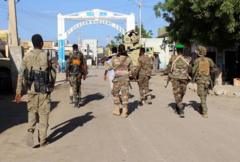High-stakes nuclear talks between the US and Iran have officially commenced in Oman, marking a significant diplomatic engagement since the US withdrawal from the 2015 nuclear deal.
Nuclear Negotiations Resumed: US and Iran Meet in Oman

Nuclear Negotiations Resumed: US and Iran Meet in Oman
Tensions rise as US and Iran engage in pivotal discussions in Muscat over nuclear program.
Recent events have brought both the United States and Iran to the negotiating table in Muscat, Oman, as crucial discussions surrounding Iran's nuclear program take center stage. Iranian Foreign Minister Abbas Araghchi expressed Iran's aspiration for a "fair agreement" while addressing state television. This comes in the wake of US President Donald Trump's 2018 exit from the original nuclear pact, a move that has created considerable tension between the two nations.
The ongoing discussions aim to set a foundational framework for future negotiations, signaling a potential shift in rhetoric as both countries express a desire for dialogue. While the format of the meetings remains somewhat ambiguous—whether direct or indirect communication will prevail—both sides are determined to explore what terms of a new agreement might look like.
Araghchi emphasized the importance of approaching negotiations from an equal stance. His delegation, comprised of experienced negotiators, is dedicated to establishing grounds for dialogue focused on limiting Iran's nuclear ambitions in exchange for the easing of sanctions. US envoy Steve Witkoff echoed the sentiment of the need for a face-to-face meeting, indicating the serious nature of these negotiations.
Trump's recent correspondence with Iran's Supreme Leader, through the United Arab Emirates, reflects a clear intention to establish a deal aimed at preventing Iran from developing nuclear capabilities. This comes amid rising pressures, with Trump declaring a formidable response if negotiations fail. Meanwhile, Iran remains steadfast in asserting that their nuclear pursuits are peaceful and firmly disputes any intentions of developing nuclear weapons.
The talks in Oman are crucial, as any agreement may set the framework for future diplomacy regarding nuclear non-proliferation, reducing tensions that have escalated in recent years. With the stakes higher than ever, both nations are poised to either pave the way for a new understanding or face the peril of further conflict.
The ongoing discussions aim to set a foundational framework for future negotiations, signaling a potential shift in rhetoric as both countries express a desire for dialogue. While the format of the meetings remains somewhat ambiguous—whether direct or indirect communication will prevail—both sides are determined to explore what terms of a new agreement might look like.
Araghchi emphasized the importance of approaching negotiations from an equal stance. His delegation, comprised of experienced negotiators, is dedicated to establishing grounds for dialogue focused on limiting Iran's nuclear ambitions in exchange for the easing of sanctions. US envoy Steve Witkoff echoed the sentiment of the need for a face-to-face meeting, indicating the serious nature of these negotiations.
Trump's recent correspondence with Iran's Supreme Leader, through the United Arab Emirates, reflects a clear intention to establish a deal aimed at preventing Iran from developing nuclear capabilities. This comes amid rising pressures, with Trump declaring a formidable response if negotiations fail. Meanwhile, Iran remains steadfast in asserting that their nuclear pursuits are peaceful and firmly disputes any intentions of developing nuclear weapons.
The talks in Oman are crucial, as any agreement may set the framework for future diplomacy regarding nuclear non-proliferation, reducing tensions that have escalated in recent years. With the stakes higher than ever, both nations are poised to either pave the way for a new understanding or face the peril of further conflict.























